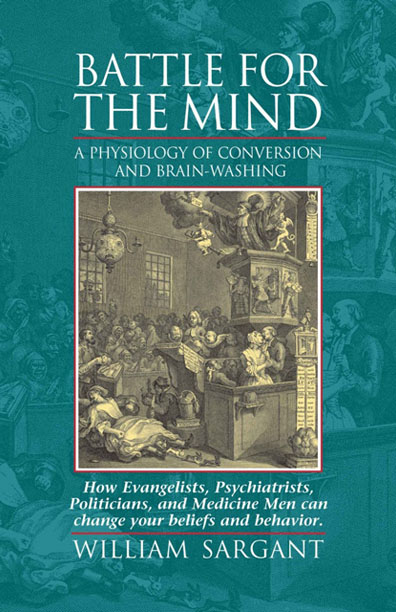Battle for the Mind
A Physiology of Conversion and Brainwashing
William Sargant
William Sargant
For many years until his death in 1988, William Sargant was a leading physician in psychological medicine. His research in World War II showed that with enough battle exposure, every soldier eventually shows the symptoms of battle fatigue, shell shock, or what we know now as post-traumatic stress disorder (PTSD). He went further to look at similar processes in religious conversion, spirit possession, brainwashing, political conversion, and the consultation of oracles in the ancient world. His basis was a Pavlovian theory, formulated more than seventy years earlier, but he extended Pavlov’s model, sharing much with modern theories of PTSD.
Battle for the Mind
A Physiology of Conversion and Brainwashing
William Sargant
How can an evangelist convert a hardboiled sophisticate? Why does a prisoner of war sign a confession‚ that he knows is false? How is a criminal pressured into admitting his guilt? Do the evangelist, the POW’s captor, and the policeman use similar methods to gain their ends?
These and other compelling questions are discussed in this definitive work. Sargant spells out and illustrates the basic technique used by evangelists, psychiatrists, advertisers, governments and other brainwashers to disperse the patterns of belief and behavior already established in the minds of their hearers, and to substitute new patterns. Beyond the implications for more successful treatments of PTSD, insight into this process might make all of us more capable of rational, informed choice in ideology — or even rejecting ideology and dogma in favor of dealing with reality.
“This mechanism holds the possibility of explaining and understanding much of how people suddenly change direction in life, and some of the strangest religious and spiritual behavior ever described among human beings. Perhaps most important, understanding it can give us insight into the formation of social bonds, the development of gangs and groups, and allow us to make more informed choices as individuals, as a society, and as a culture, how we want our own groups to develop.”
—Charles Swencionis, Ph.D., Albert Einstein College of Medicine, from the Foreword










